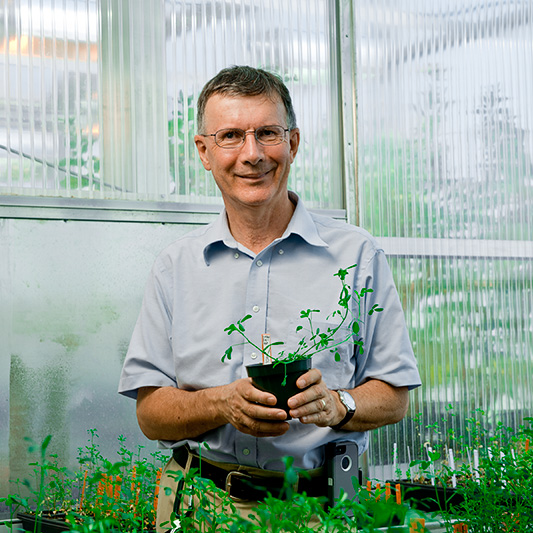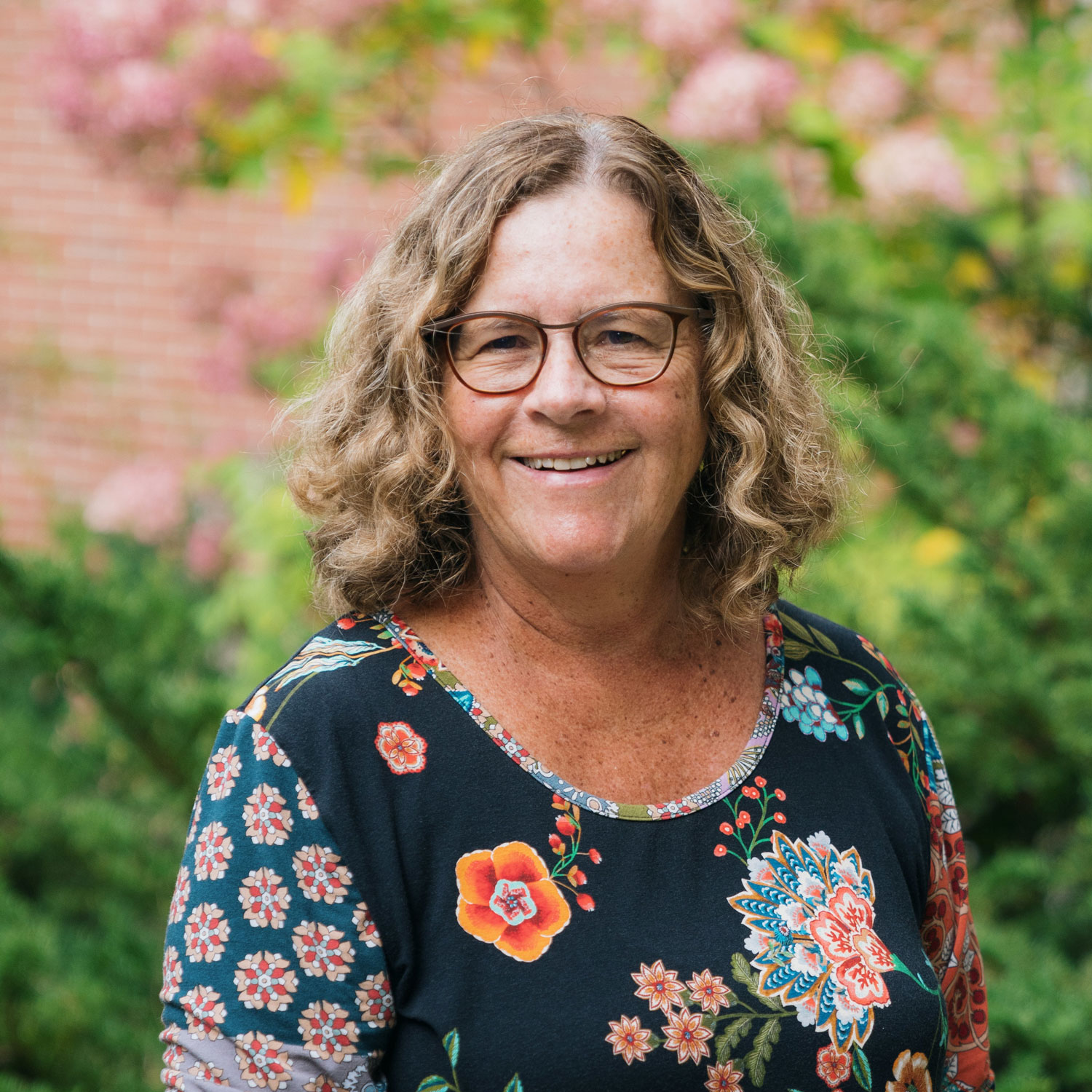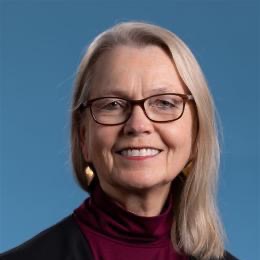Scientific Advisory Board
The Plant Resilience Institute (PRI) has an external Scientific Advisory Board (SAB), comprised of recognized plant science leaders knowledgeable about plant resilience and associated challenges to agriculture. The SAB assesses PRI's research programs, including progress and impact, and provides guidance to PRI leadership. Learn more about our SAB members below.

Richard A. Dixon is Distinguished Research Professor Emeritus in the Department of Biological Sciences, University of North Texas, and Distinguished Visiting Lecturer of the Hagler Institute for Advanced Study, Texas A&M University, College Station. He also holds adjunct professorships at the University of Missouri at Columbia and Oklahoma State University at Stillwater. He was Distinguished Professor and Samuel Roberts Noble Research Chair, Senior Vice President and Founding Director of the Plant Biology Division at the Samuel Roberts Noble Foundation, Ardmore, Oklahoma, where he worked from 1988-2013. He received his Bachelors’ and Doctoral degrees in Biochemistry and Botany from the University of Oxford, UK, and postdoctoral training in Plant Biochemistry at the University of Cambridge, UK. He was awarded the Doctor of Science degree for his research achievements by the University of Oxford in 2004. His research interests center on the biochemistry, molecular biology and metabolic engineering of plant natural product pathways and their implications for agriculture and human health, and the engineering of lignocellulosic biomass for the improvement of forages and feedstocks for the bioeconomy. He has published over 530 papers and chapters on these and related topics in international journals, which have been cited over 97,000 times. Professor Dixon is a Fellow of the Royal Society (elected in 2018), Member of the US National Academy of Sciences (Plant and Soil Sciences Section, elected in 2007), Fellow of the American Association for the Advancement of Science (elected in 2003), Fellow of the National Academy of Inventors (elected in 2014), and Fellow of the American Society of Plant Biologists (elected in 2018) and has been named by the Institute for Scientific Information as one of the 10 most cited authors in the plant and animal sciences. He was President of the American Society of Plant Biologists (2015-16) and currently serves as Editor-in-Chief of Philosophical Transactions of the Royal Society B.

Mary Lou Guerinot is the Ronald and Deborah Harris Professor in the Department of Biological Sciences at Dartmouth College. She earned her bachelor’s degree in biology at Cornell University and her Ph.D. in biology from Dalhousie University, followed by postdoctoral studies at the University of Maryland and at the DOE–MSU Plant Research Laboratory. At Dartmouth, where she rose through the ranks to full professor, she has served as chair of the Department of Biological Sciences, as Associate Dean of the Faculty for the Sciences and as Vice Provost. She has also served as a member of the Advisory Committee for Biological Sciences at the National Science Foundation, is a Past President and past Chair of the Board of Trustees of the American Society of Plant Biologists (ASPB) and is a fellow of the American Association for the Advancement of Science and ASPB. She was elected to the National Academy of Sciences in 2016. She is a recipient of the Dartmouth Graduate Mentoring Award, the Dean of Faculty Award for Outstanding Mentoring and Advising and the Dennis R. Hoagland Award and Stephen Hales Prize from ASPB.
More than 2 billion people are iron-deficient because their plant-based diets are not a rich source of iron. Guerinot’s research has identified key players involved in the mobilization of iron from the soil to the seed, including the FRO2 ferric chelate reductase that catalyzes the rate limiting step at the root-soil interface; a divalent cation transporter, IRT1, essential for iron uptake from the soil; FRD3, an effluxer necessary for movement of iron from the root to the shoot and VIT1 that transports iron into the vacuole from where it can be mobilized by germinating seeds. She has helped to define the field of ionomics, an innovative combination of high throughput elemental analysis using inductively coupled plasma mass spectroscopy (ICP-MS), with bioinformatics, molecular genetics and ecology, providing a new conceptual framework for plant mineral nutrition. To overcome some of the historic limitations in studying metal distribution in plants, she has pioneered the use of X-ray fluorescence spectroscopy to simultaneously map the distribution of multiple elements at the cellular and sub-cellular levels.

Dr. Leach is a plant pathologist who studies the molecular basis of plant disease susceptibility and resistance and how these responses are influenced by interactions within the phytobiome. She currently serves as the Research Associate Dean at the College of Agricultural Sciences at Colorado State University. Dr. Leach is the current President of the International Society of Plant Pathology and is a Fellow and a past President of the American Phytopathological Society (APS). She served on the APS Public Policy Board for 16 years, leading advocacy efforts such as the Phytobiomes Initiative, a systems-level approach to improving crop productivity. Dr. Leach is a Fellow of the American Association for the Advancement of Science (AAAS) and a Fellow of the American Academy of Microbiology. She is a member of the Board on Agriculture and Natural Resources of the US National Academy of Sciences. In 2019, Leach was awarded the Agropolis Fondation Louis Malassis International Scientific Prize for Agriculture and Food for Distinguished Scientist, and in 2020, she was presented the APS Award of Distinction, an award that has been given only 17 times in the 112 years of APS’s history. Leach was elected to the US National Academy of Sciences in 2021. Dr. Leach received her Ph.D. from the University of Wisconsin, Madison, and BS and MS degrees from the University of Nebraska, Lincoln, with additional postdoctoral studies completed at East Malling Research, Kent, UK.

Corné Pieterse is Distinguished Professor of the Faculty of Science, Chair of the Plant-Microbe Interactions group, and Scientific Director of the Institute of Environmental Biology at Utrecht University. His research group investigates how the plant immune system protects plants against microbial pathogens and insect herbivores, and how beneficial microbes in the plant root microbiome stimulate plant growth and immunity. Current research in his group is focused on discovery of plant-beneficial functions that are encoded by the root microbiome and the role of plant genes and metabolites (e.g. coumarins) that aid in maximizing profitable plant growth and health functions from the root microbiome. With his research he aims to contribute to grand societal challenges, such as food security and sustainable agriculture.
Pieterse’s research group operates at the international forefront of plant and microbe biology and has been supported by several personal grants, including Spinoza Prize (2,5 M€) , ERC Advanced (2,5 M€), and NWO VICI (1,25 M€), and large team-effort grants, such as NWO Gravitation MiCROP (20 M€). In the past 9 years he was listed as a Highly Cited Researcher (top 1%). Twenty-seven of his former PhDs and postdocs currently have leadership positions in academia or industry. Nationally, he is one of the founders of the Netherlands Plant-Ecophenotyping Centre (NPEC) and serves on the boards of the national Graduate School Experimental Plant Sciences and the Utrecht Graduate School of Life Sciences. Internationally, Pieterse is engaged in two Horizon Europe programs, and serves on international advisory boards at research centers in Germany and France. Currently he is one of the coordinators of the Plants and Microbiomes Working Group of the European Plant Science Organization (EPSO), which is aimed at organizing funding and infrastructure in Europe for the science field. Pieterse is an elected member of the Royal Netherlands Academy of Arts and Sciences (KNAW) and the “Koninklijke Hollandsche Maatschappij der Wetenschappen”.

Anne W. Sylvester is the Director of Research at the Marine Biological Laboratory. Her role is to oversee the research enterprise through short and long-term strategic planning. The position includes facilitating the success of resident and visiting research programs and research support services, guiding research partnerships, identifying funding opportunities, and coordinating research efforts that align with the MBL’s scientific vision. Dr. Sylvester previously served as a Program Director at the National Science Foundation in the Directorate of Biological Sciences after a research and teaching career as a Professor at the University of Wyoming where she directed a continuously funded research program in maize development genetics and genomics. Dr. Sylvester has been active nationally in service to the maize genetics community as a member of the Maize Genome Sequencing Advisory Board, was elected to the Maize Genetics Executive Committee, and has long promoted collaborative research initiatives that develop and distribute genomic resources. Dr. Sylvester was appointed as a Director in the University of Wyoming’s Office of Research to develop a collaborative research and education center. In this role, she contributed to strategic visioning, successful funding and implementation of a new statewide center focused on environmental hydrology and geophysics. Sylvester received her Ph.D. from the University of Washington where she conducted graduate research at the UW Friday Harbor Marine Laboratory. Sylvester received postdoctoral fellowships in plant developmental biology at Stanford University and in maize developmental genetics at the University of California-Berkeley.
